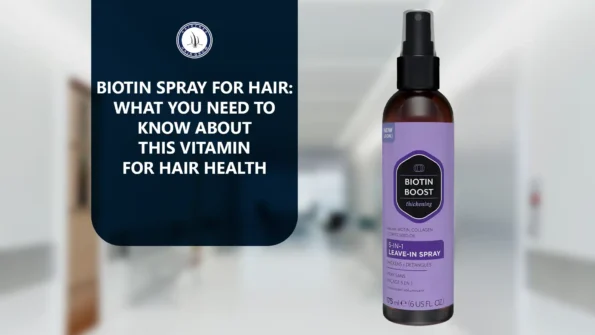Biotin, also known as Vitamin B7 or Vitamin H, is a crucial vitamin for our body, even though we can’t produce it on our own. Biotin plays a significant role in converting nutrients like fats and carbs into energy, as well as helping with gene expression and cell signaling. But most people recognize it for its benefits to hair, skin, and nails. This blog will dive into what biotin is, how much you need daily, signs of biotin deficiency, and, of course, the big question: can biotin actually help with hair growth? Biotin spray for hair helps promote stronger, healthier, and shinier locks.
What is Biotin and Why Is It Important?
Biotin is naturally found in various foods like meat, fish, nuts, seeds, and vegetables. Even sweet potatoes contain this essential vitamin. The National Institute of Health (NIH) recommends that adults get around 30 micrograms of biotin daily—just a tiny amount, which shows why biotin deficiency is rare. Many of us already get enough biotin through a balanced diet, but factors like genetics, pregnancy, and smoking can increase the risk of deficiency.
What Are the Benefits of Biotin Spray for Hair?
While biotin spray and other biotin supplements are often advertised for hair growth, there is still debate on whether they truly make a difference if you’re not deficient. Hair is made mostly of keratin, a structural protein that biotin is thought to support. The idea is that biotin spray for hair growth might help improve keratin production, leading to stronger hair.
Some research suggests that taking biotin can strengthen keratin and improve hair structure. This has led many hair care companies to promote biotin as a solution for thicker, healthier hair. However, dermatologists point out that there’s limited evidence to support this, especially for people who are already getting enough biotin from their diets. The NIH even reports that there’s not enough data to recommend extra biotin for hair health if you don’t have a deficiency.
Do You Really Need Extra Biotin for Hair Health?
Since biotin is water-soluble, our bodies don’t store it. That means any excess biotin is simply flushed out when we urinate. If you have normal levels of biotin, adding more will likely not bring extra benefits, especially for hair, skin, and nails. To know if you are deficient in biotin, you’d need to have your plasma biotin levels checked by a doctor.
For most people, a biotin deficiency is very rare. Normal blood plasma levels of biotin range from 200 to 1,200 ng/L, with an ideal level between 400 to 500 ng/L for younger adults and children. If your levels drop below 100 ng/L, which can happen during pregnancy, your doctor may recommend biotin supplements or dietary changes to restore balance.
Is Biotin Spray Effective for Hair Loss?
A big reason many people turn to biotin is due to hair loss concerns. While biotin spray for hair loss is marketed as a solution, it’s essential to know that hair loss usually has deeper biological causes that most vitamins, including biotin, may not address. Effective treatments often involve changes in lifestyle, hormone balancing, or medications like minoxidil and finasteride. If you’re dealing with hair loss, it’s best to consult a healthcare provider who can help identify the root cause and offer tailored solutions.
Foods and Supplements for Biotin
Biotin is abundant in many foods, including egg yolks, nuts, seeds, leafy greens, and certain vegetables. For those considering biotin supplements or sprays, it’s important to be aware that many biotin products deliver much higher doses than the recommended daily intake of 30 mcg. Some supplements can contain up to 10,000 mcg per dose! While excess biotin isn’t toxic, very high levels can interfere with certain lab tests, leading to inaccurate results for hormone or heart tests. If you’re taking biotin supplements, let your doctor know, especially before undergoing any lab work.
Can Eating Too Many Raw Eggs Cause Biotin Deficiency?
Interestingly, a protein called avidin, found in egg whites, binds to biotin and can block its absorption if you regularly eat raw or undercooked eggs. However, cooking eggs above 185°F breaks down avidin, making biotin available for absorption. So, if you’re consuming eggs, make sure they’re well-cooked to prevent any risk of biotin deficiency.
Potential Side Effects of Biotin Spray
When it comes to biotin spray benefits and possible biotin spray side effects, the main risk is overuse. While biotin itself isn’t harmful in high doses because it’s water-soluble, excessive amounts can alter lab test results, which may be concerning if you need accurate health screenings. Always keep your healthcare team informed of any supplements, including biotin, you’re using, as a best practice.
Final Thoughts: Is Biotin Spray Right for You?
In summary, biotin is indeed essential, but most of us get enough through our daily diet. Extra biotin may not provide additional benefits for hair health unless you are deficient. If hair loss is a concern, there are more reliable, scientifically proven methods to explore, including lifestyle changes, vitamin D, and approved treatments like minoxidil and finasteride.
If you’re searching for expert hair loss advice and treatment, Hairfree & Hairgrow Clinic is here to help. With their experienced professionals and tailored approach to hair health, they offer solutions for hair loss that go beyond vitamins. Visit Hairfree & Hairgrow Clinic for personalized recommendations that can make a real difference in your hair journey.
Written By
MBBS, MD
Dr. Pratibha Pradhan is a hair restoration expert specializing in biotin spray for hair. She provides expert insights on how biotin spray nourishes the scalp, strengthens hair, and promotes growth, helping patients achieve healthier, thicker, and more resilient hair naturally.
Disclaimer
We’ve made all possible efforts to ensure that the information provided here is accurate, up-to-date and complete, however, it should not be treated as a substitute for professional medical advice, diagnosis or treatment. See Detailed Disclaimers Here.



